LAW2000 Business Law: Case Studies in Contract, Agency & Property
VerifiedAdded on 2023/06/14
|8
|2421
|264
Case Study
AI Summary
This assignment presents a series of business law case studies focusing on contract law, agency law, and property law. The first case examines the enforceability of a domestic agreement between a grandmother and granddaughter regarding property transfer, analyzing the intention to create legal relations. The second case delves into contract formation, counteroffers, and acceptance via electronic communication, determining whether a valid contract exists for the sale of a car. The third case explores agency law, specifically vicarious liability, and whether a principal is bound by an agent's unauthorized actions in a furniture sale. The fourth case addresses intellectual property law, focusing on copyright infringement in music composition. Finally, the fifth case considers real property law and the enforceability of a restraint of trade clause in the sale of a hairdressing business. Desklib offers this and other solved assignments for students.
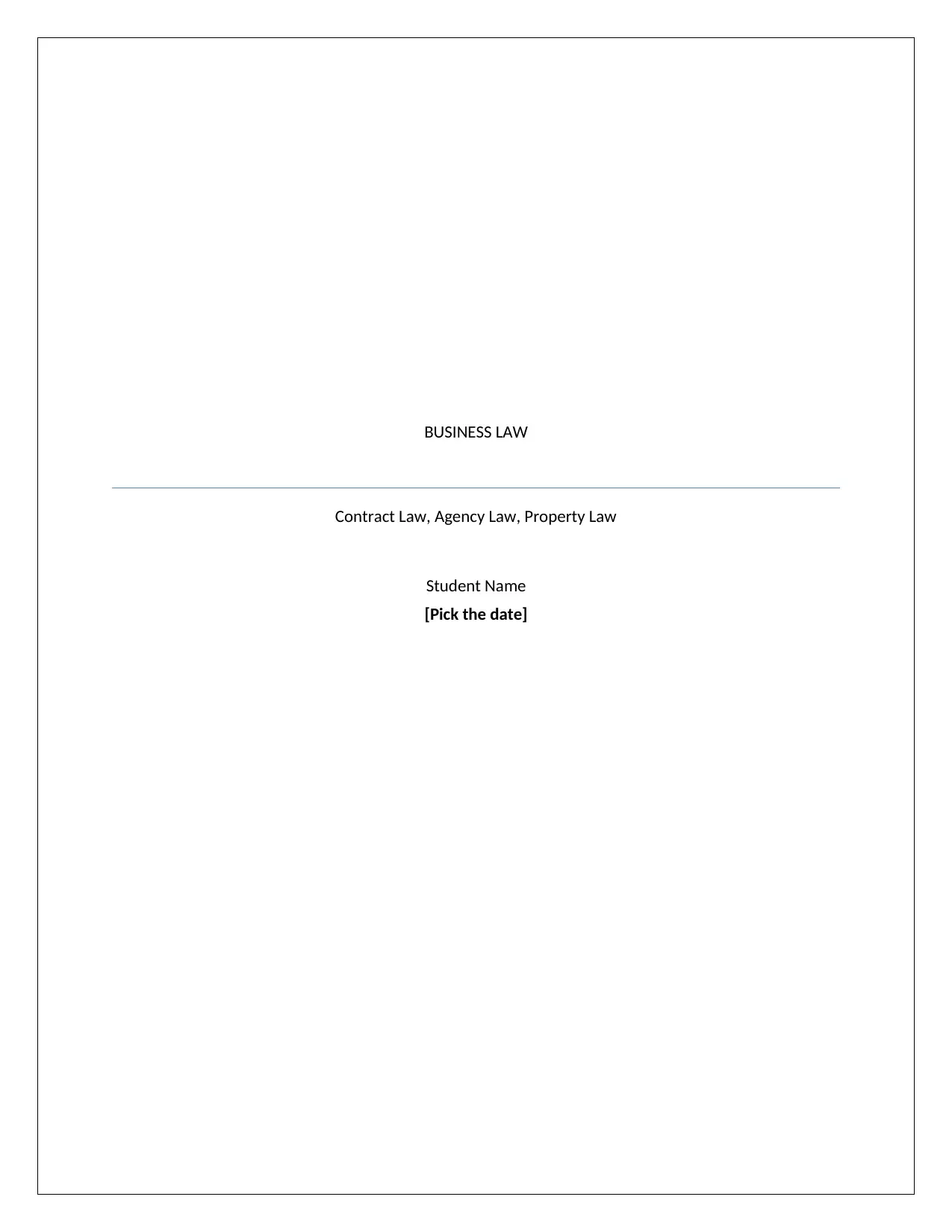
BUSINESS LAW
Contract Law, Agency Law, Property Law
Student Name
[Pick the date]
Contract Law, Agency Law, Property Law
Student Name
[Pick the date]
Paraphrase This Document
Need a fresh take? Get an instant paraphrase of this document with our AI Paraphraser
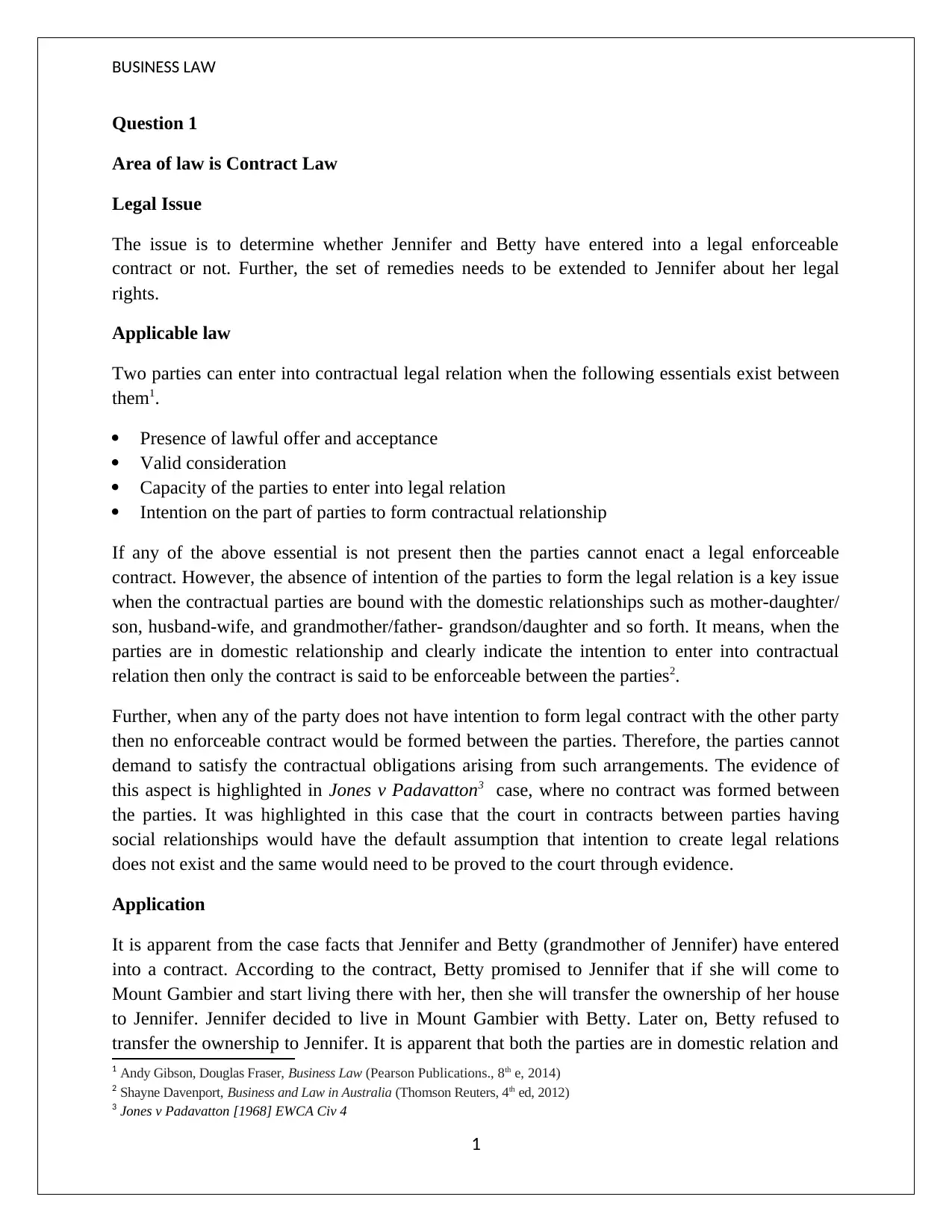
BUSINESS LAW
Question 1
Area of law is Contract Law
Legal Issue
The issue is to determine whether Jennifer and Betty have entered into a legal enforceable
contract or not. Further, the set of remedies needs to be extended to Jennifer about her legal
rights.
Applicable law
Two parties can enter into contractual legal relation when the following essentials exist between
them1.
Presence of lawful offer and acceptance
Valid consideration
Capacity of the parties to enter into legal relation
Intention on the part of parties to form contractual relationship
If any of the above essential is not present then the parties cannot enact a legal enforceable
contract. However, the absence of intention of the parties to form the legal relation is a key issue
when the contractual parties are bound with the domestic relationships such as mother-daughter/
son, husband-wife, and grandmother/father- grandson/daughter and so forth. It means, when the
parties are in domestic relationship and clearly indicate the intention to enter into contractual
relation then only the contract is said to be enforceable between the parties2.
Further, when any of the party does not have intention to form legal contract with the other party
then no enforceable contract would be formed between the parties. Therefore, the parties cannot
demand to satisfy the contractual obligations arising from such arrangements. The evidence of
this aspect is highlighted in Jones v Padavatton3 case, where no contract was formed between
the parties. It was highlighted in this case that the court in contracts between parties having
social relationships would have the default assumption that intention to create legal relations
does not exist and the same would need to be proved to the court through evidence.
Application
It is apparent from the case facts that Jennifer and Betty (grandmother of Jennifer) have entered
into a contract. According to the contract, Betty promised to Jennifer that if she will come to
Mount Gambier and start living there with her, then she will transfer the ownership of her house
to Jennifer. Jennifer decided to live in Mount Gambier with Betty. Later on, Betty refused to
transfer the ownership to Jennifer. It is apparent that both the parties are in domestic relation and
1 Andy Gibson, Douglas Fraser, Business Law (Pearson Publications., 8th e, 2014)
2 Shayne Davenport, Business and Law in Australia (Thomson Reuters, 4th ed, 2012)
3 Jones v Padavatton [1968] EWCA Civ 4
1
Question 1
Area of law is Contract Law
Legal Issue
The issue is to determine whether Jennifer and Betty have entered into a legal enforceable
contract or not. Further, the set of remedies needs to be extended to Jennifer about her legal
rights.
Applicable law
Two parties can enter into contractual legal relation when the following essentials exist between
them1.
Presence of lawful offer and acceptance
Valid consideration
Capacity of the parties to enter into legal relation
Intention on the part of parties to form contractual relationship
If any of the above essential is not present then the parties cannot enact a legal enforceable
contract. However, the absence of intention of the parties to form the legal relation is a key issue
when the contractual parties are bound with the domestic relationships such as mother-daughter/
son, husband-wife, and grandmother/father- grandson/daughter and so forth. It means, when the
parties are in domestic relationship and clearly indicate the intention to enter into contractual
relation then only the contract is said to be enforceable between the parties2.
Further, when any of the party does not have intention to form legal contract with the other party
then no enforceable contract would be formed between the parties. Therefore, the parties cannot
demand to satisfy the contractual obligations arising from such arrangements. The evidence of
this aspect is highlighted in Jones v Padavatton3 case, where no contract was formed between
the parties. It was highlighted in this case that the court in contracts between parties having
social relationships would have the default assumption that intention to create legal relations
does not exist and the same would need to be proved to the court through evidence.
Application
It is apparent from the case facts that Jennifer and Betty (grandmother of Jennifer) have entered
into a contract. According to the contract, Betty promised to Jennifer that if she will come to
Mount Gambier and start living there with her, then she will transfer the ownership of her house
to Jennifer. Jennifer decided to live in Mount Gambier with Betty. Later on, Betty refused to
transfer the ownership to Jennifer. It is apparent that both the parties are in domestic relation and
1 Andy Gibson, Douglas Fraser, Business Law (Pearson Publications., 8th e, 2014)
2 Shayne Davenport, Business and Law in Australia (Thomson Reuters, 4th ed, 2012)
3 Jones v Padavatton [1968] EWCA Civ 4
1
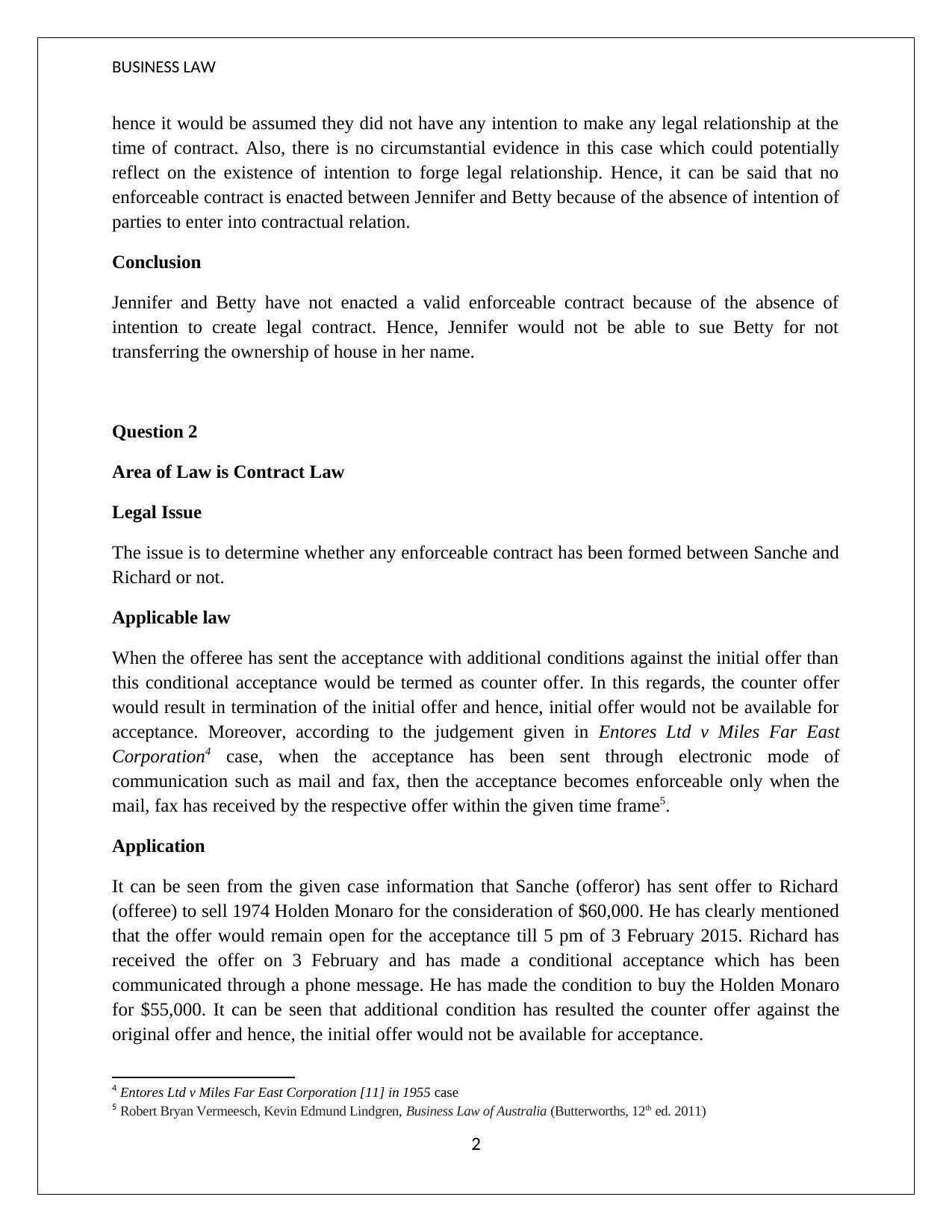
BUSINESS LAW
hence it would be assumed they did not have any intention to make any legal relationship at the
time of contract. Also, there is no circumstantial evidence in this case which could potentially
reflect on the existence of intention to forge legal relationship. Hence, it can be said that no
enforceable contract is enacted between Jennifer and Betty because of the absence of intention of
parties to enter into contractual relation.
Conclusion
Jennifer and Betty have not enacted a valid enforceable contract because of the absence of
intention to create legal contract. Hence, Jennifer would not be able to sue Betty for not
transferring the ownership of house in her name.
Question 2
Area of Law is Contract Law
Legal Issue
The issue is to determine whether any enforceable contract has been formed between Sanche and
Richard or not.
Applicable law
When the offeree has sent the acceptance with additional conditions against the initial offer than
this conditional acceptance would be termed as counter offer. In this regards, the counter offer
would result in termination of the initial offer and hence, initial offer would not be available for
acceptance. Moreover, according to the judgement given in Entores Ltd v Miles Far East
Corporation4 case, when the acceptance has been sent through electronic mode of
communication such as mail and fax, then the acceptance becomes enforceable only when the
mail, fax has received by the respective offer within the given time frame5.
Application
It can be seen from the given case information that Sanche (offeror) has sent offer to Richard
(offeree) to sell 1974 Holden Monaro for the consideration of $60,000. He has clearly mentioned
that the offer would remain open for the acceptance till 5 pm of 3 February 2015. Richard has
received the offer on 3 February and has made a conditional acceptance which has been
communicated through a phone message. He has made the condition to buy the Holden Monaro
for $55,000. It can be seen that additional condition has resulted the counter offer against the
original offer and hence, the initial offer would not be available for acceptance.
4 Entores Ltd v Miles Far East Corporation [11] in 1955 case
5 Robert Bryan Vermeesch, Kevin Edmund Lindgren, Business Law of Australia (Butterworths, 12th ed. 2011)
2
hence it would be assumed they did not have any intention to make any legal relationship at the
time of contract. Also, there is no circumstantial evidence in this case which could potentially
reflect on the existence of intention to forge legal relationship. Hence, it can be said that no
enforceable contract is enacted between Jennifer and Betty because of the absence of intention of
parties to enter into contractual relation.
Conclusion
Jennifer and Betty have not enacted a valid enforceable contract because of the absence of
intention to create legal contract. Hence, Jennifer would not be able to sue Betty for not
transferring the ownership of house in her name.
Question 2
Area of Law is Contract Law
Legal Issue
The issue is to determine whether any enforceable contract has been formed between Sanche and
Richard or not.
Applicable law
When the offeree has sent the acceptance with additional conditions against the initial offer than
this conditional acceptance would be termed as counter offer. In this regards, the counter offer
would result in termination of the initial offer and hence, initial offer would not be available for
acceptance. Moreover, according to the judgement given in Entores Ltd v Miles Far East
Corporation4 case, when the acceptance has been sent through electronic mode of
communication such as mail and fax, then the acceptance becomes enforceable only when the
mail, fax has received by the respective offer within the given time frame5.
Application
It can be seen from the given case information that Sanche (offeror) has sent offer to Richard
(offeree) to sell 1974 Holden Monaro for the consideration of $60,000. He has clearly mentioned
that the offer would remain open for the acceptance till 5 pm of 3 February 2015. Richard has
received the offer on 3 February and has made a conditional acceptance which has been
communicated through a phone message. He has made the condition to buy the Holden Monaro
for $55,000. It can be seen that additional condition has resulted the counter offer against the
original offer and hence, the initial offer would not be available for acceptance.
4 Entores Ltd v Miles Far East Corporation [11] in 1955 case
5 Robert Bryan Vermeesch, Kevin Edmund Lindgren, Business Law of Australia (Butterworths, 12th ed. 2011)
2
⊘ This is a preview!⊘
Do you want full access?
Subscribe today to unlock all pages.

Trusted by 1+ million students worldwide
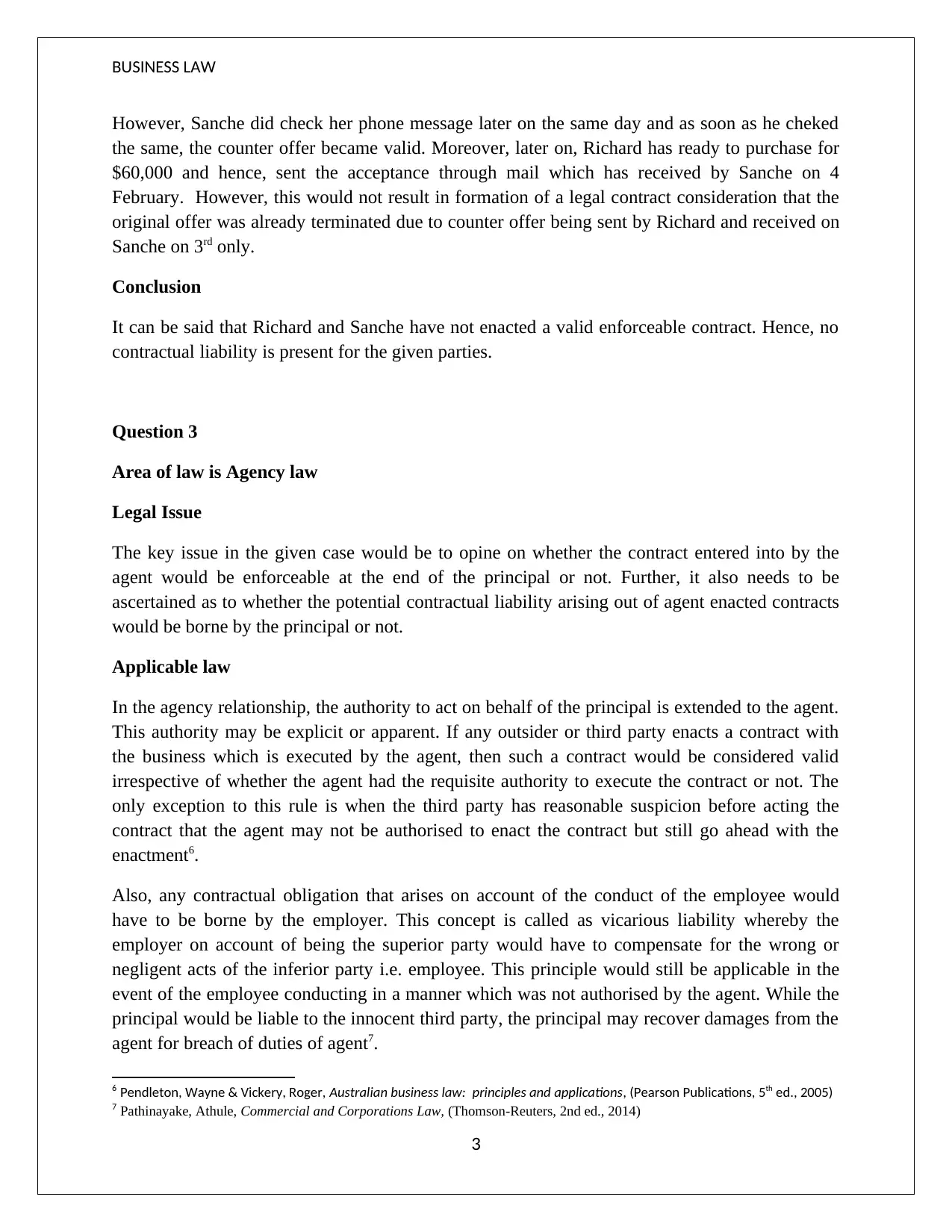
BUSINESS LAW
However, Sanche did check her phone message later on the same day and as soon as he cheked
the same, the counter offer became valid. Moreover, later on, Richard has ready to purchase for
$60,000 and hence, sent the acceptance through mail which has received by Sanche on 4
February. However, this would not result in formation of a legal contract consideration that the
original offer was already terminated due to counter offer being sent by Richard and received on
Sanche on 3rd only.
Conclusion
It can be said that Richard and Sanche have not enacted a valid enforceable contract. Hence, no
contractual liability is present for the given parties.
Question 3
Area of law is Agency law
Legal Issue
The key issue in the given case would be to opine on whether the contract entered into by the
agent would be enforceable at the end of the principal or not. Further, it also needs to be
ascertained as to whether the potential contractual liability arising out of agent enacted contracts
would be borne by the principal or not.
Applicable law
In the agency relationship, the authority to act on behalf of the principal is extended to the agent.
This authority may be explicit or apparent. If any outsider or third party enacts a contract with
the business which is executed by the agent, then such a contract would be considered valid
irrespective of whether the agent had the requisite authority to execute the contract or not. The
only exception to this rule is when the third party has reasonable suspicion before acting the
contract that the agent may not be authorised to enact the contract but still go ahead with the
enactment6.
Also, any contractual obligation that arises on account of the conduct of the employee would
have to be borne by the employer. This concept is called as vicarious liability whereby the
employer on account of being the superior party would have to compensate for the wrong or
negligent acts of the inferior party i.e. employee. This principle would still be applicable in the
event of the employee conducting in a manner which was not authorised by the agent. While the
principal would be liable to the innocent third party, the principal may recover damages from the
agent for breach of duties of agent7.
6 Pendleton, Wayne & Vickery, Roger, Australian business law: principles and applications, (Pearson Publications, 5th ed., 2005)
7 Pathinayake, Athule, Commercial and Corporations Law, (Thomson-Reuters, 2nd ed., 2014)
3
However, Sanche did check her phone message later on the same day and as soon as he cheked
the same, the counter offer became valid. Moreover, later on, Richard has ready to purchase for
$60,000 and hence, sent the acceptance through mail which has received by Sanche on 4
February. However, this would not result in formation of a legal contract consideration that the
original offer was already terminated due to counter offer being sent by Richard and received on
Sanche on 3rd only.
Conclusion
It can be said that Richard and Sanche have not enacted a valid enforceable contract. Hence, no
contractual liability is present for the given parties.
Question 3
Area of law is Agency law
Legal Issue
The key issue in the given case would be to opine on whether the contract entered into by the
agent would be enforceable at the end of the principal or not. Further, it also needs to be
ascertained as to whether the potential contractual liability arising out of agent enacted contracts
would be borne by the principal or not.
Applicable law
In the agency relationship, the authority to act on behalf of the principal is extended to the agent.
This authority may be explicit or apparent. If any outsider or third party enacts a contract with
the business which is executed by the agent, then such a contract would be considered valid
irrespective of whether the agent had the requisite authority to execute the contract or not. The
only exception to this rule is when the third party has reasonable suspicion before acting the
contract that the agent may not be authorised to enact the contract but still go ahead with the
enactment6.
Also, any contractual obligation that arises on account of the conduct of the employee would
have to be borne by the employer. This concept is called as vicarious liability whereby the
employer on account of being the superior party would have to compensate for the wrong or
negligent acts of the inferior party i.e. employee. This principle would still be applicable in the
event of the employee conducting in a manner which was not authorised by the agent. While the
principal would be liable to the innocent third party, the principal may recover damages from the
agent for breach of duties of agent7.
6 Pendleton, Wayne & Vickery, Roger, Australian business law: principles and applications, (Pearson Publications, 5th ed., 2005)
7 Pathinayake, Athule, Commercial and Corporations Law, (Thomson-Reuters, 2nd ed., 2014)
3
Paraphrase This Document
Need a fresh take? Get an instant paraphrase of this document with our AI Paraphraser
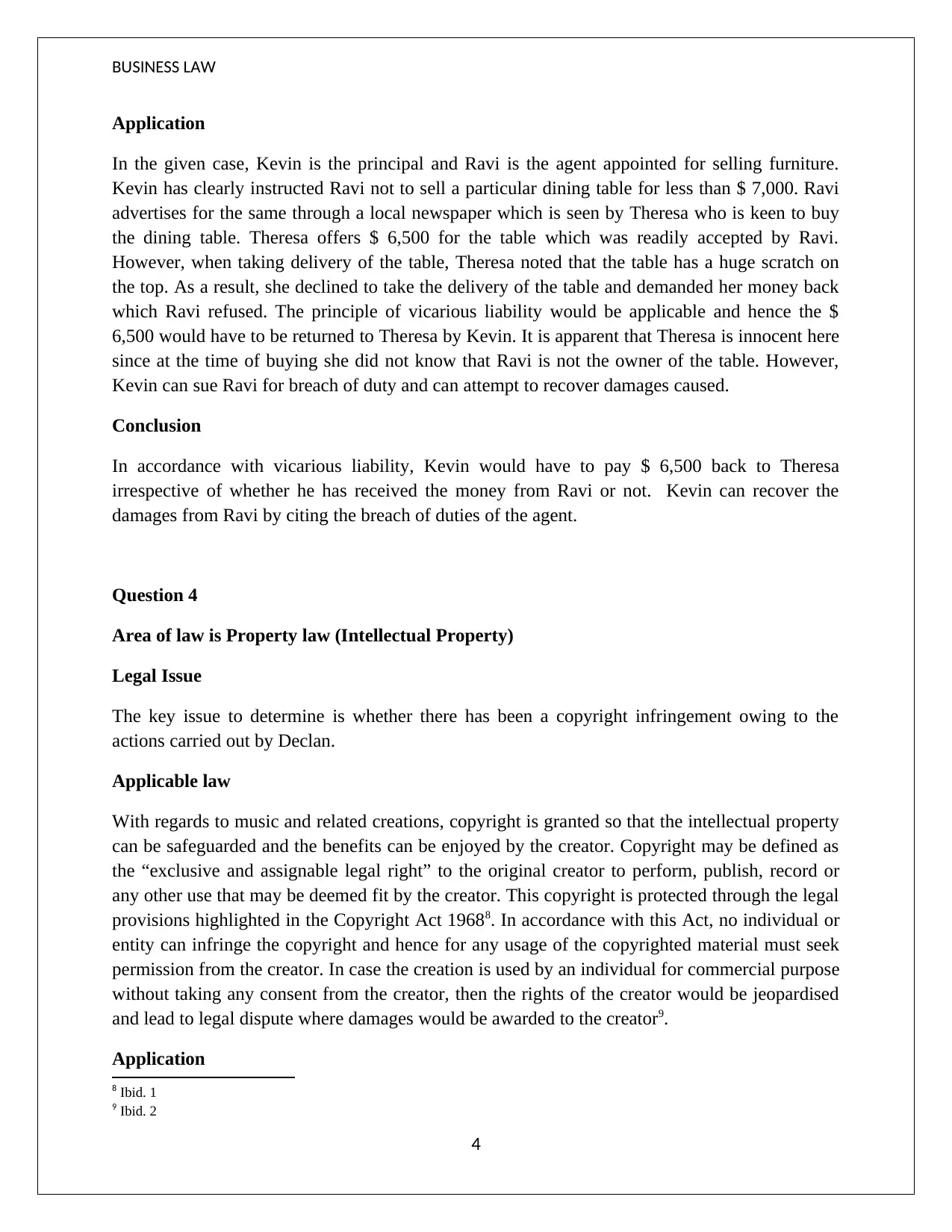
BUSINESS LAW
Application
In the given case, Kevin is the principal and Ravi is the agent appointed for selling furniture.
Kevin has clearly instructed Ravi not to sell a particular dining table for less than $ 7,000. Ravi
advertises for the same through a local newspaper which is seen by Theresa who is keen to buy
the dining table. Theresa offers $ 6,500 for the table which was readily accepted by Ravi.
However, when taking delivery of the table, Theresa noted that the table has a huge scratch on
the top. As a result, she declined to take the delivery of the table and demanded her money back
which Ravi refused. The principle of vicarious liability would be applicable and hence the $
6,500 would have to be returned to Theresa by Kevin. It is apparent that Theresa is innocent here
since at the time of buying she did not know that Ravi is not the owner of the table. However,
Kevin can sue Ravi for breach of duty and can attempt to recover damages caused.
Conclusion
In accordance with vicarious liability, Kevin would have to pay $ 6,500 back to Theresa
irrespective of whether he has received the money from Ravi or not. Kevin can recover the
damages from Ravi by citing the breach of duties of the agent.
Question 4
Area of law is Property law (Intellectual Property)
Legal Issue
The key issue to determine is whether there has been a copyright infringement owing to the
actions carried out by Declan.
Applicable law
With regards to music and related creations, copyright is granted so that the intellectual property
can be safeguarded and the benefits can be enjoyed by the creator. Copyright may be defined as
the “exclusive and assignable legal right” to the original creator to perform, publish, record or
any other use that may be deemed fit by the creator. This copyright is protected through the legal
provisions highlighted in the Copyright Act 19688. In accordance with this Act, no individual or
entity can infringe the copyright and hence for any usage of the copyrighted material must seek
permission from the creator. In case the creation is used by an individual for commercial purpose
without taking any consent from the creator, then the rights of the creator would be jeopardised
and lead to legal dispute where damages would be awarded to the creator9.
Application
8 Ibid. 1
9 Ibid. 2
4
Application
In the given case, Kevin is the principal and Ravi is the agent appointed for selling furniture.
Kevin has clearly instructed Ravi not to sell a particular dining table for less than $ 7,000. Ravi
advertises for the same through a local newspaper which is seen by Theresa who is keen to buy
the dining table. Theresa offers $ 6,500 for the table which was readily accepted by Ravi.
However, when taking delivery of the table, Theresa noted that the table has a huge scratch on
the top. As a result, she declined to take the delivery of the table and demanded her money back
which Ravi refused. The principle of vicarious liability would be applicable and hence the $
6,500 would have to be returned to Theresa by Kevin. It is apparent that Theresa is innocent here
since at the time of buying she did not know that Ravi is not the owner of the table. However,
Kevin can sue Ravi for breach of duty and can attempt to recover damages caused.
Conclusion
In accordance with vicarious liability, Kevin would have to pay $ 6,500 back to Theresa
irrespective of whether he has received the money from Ravi or not. Kevin can recover the
damages from Ravi by citing the breach of duties of the agent.
Question 4
Area of law is Property law (Intellectual Property)
Legal Issue
The key issue to determine is whether there has been a copyright infringement owing to the
actions carried out by Declan.
Applicable law
With regards to music and related creations, copyright is granted so that the intellectual property
can be safeguarded and the benefits can be enjoyed by the creator. Copyright may be defined as
the “exclusive and assignable legal right” to the original creator to perform, publish, record or
any other use that may be deemed fit by the creator. This copyright is protected through the legal
provisions highlighted in the Copyright Act 19688. In accordance with this Act, no individual or
entity can infringe the copyright and hence for any usage of the copyrighted material must seek
permission from the creator. In case the creation is used by an individual for commercial purpose
without taking any consent from the creator, then the rights of the creator would be jeopardised
and lead to legal dispute where damages would be awarded to the creator9.
Application
8 Ibid. 1
9 Ibid. 2
4
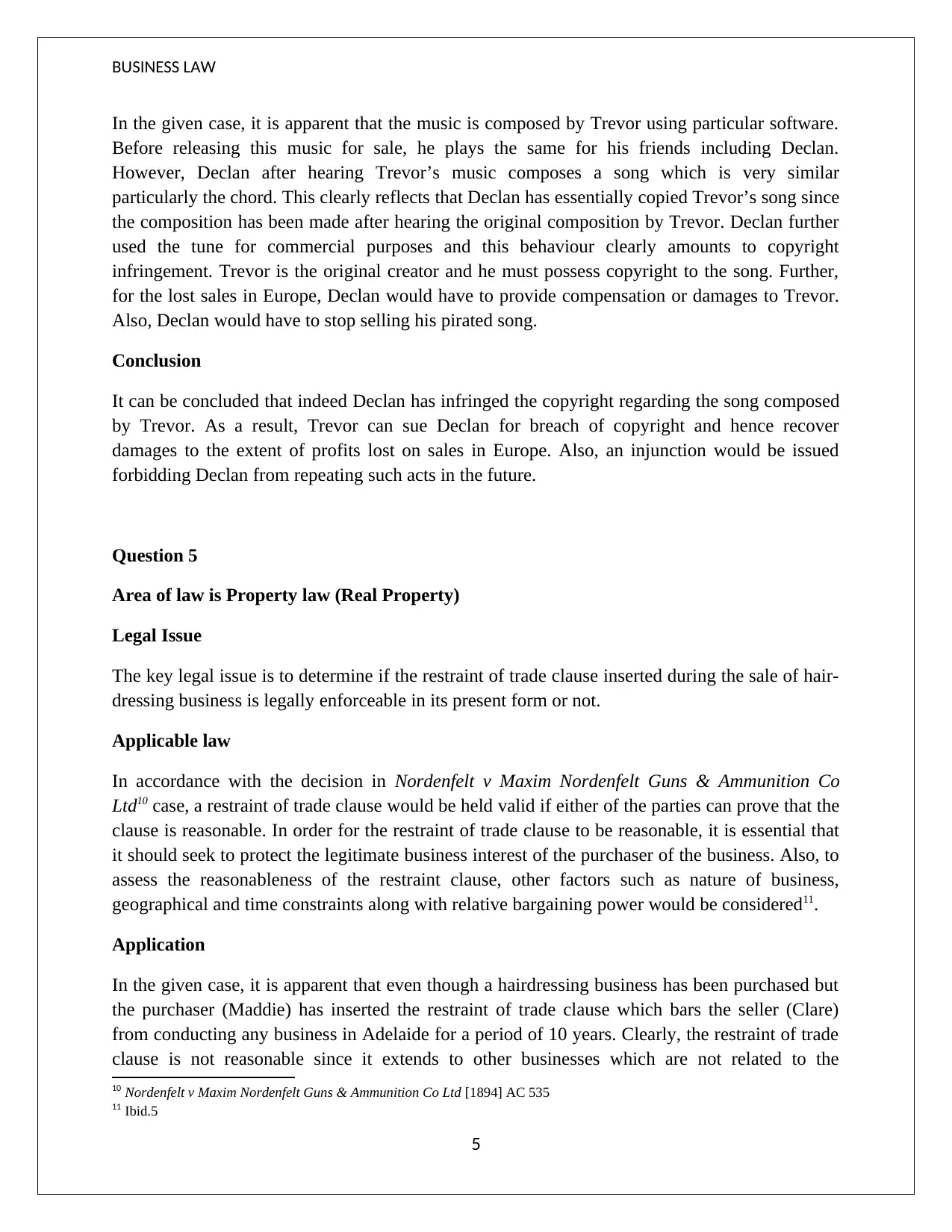
BUSINESS LAW
In the given case, it is apparent that the music is composed by Trevor using particular software.
Before releasing this music for sale, he plays the same for his friends including Declan.
However, Declan after hearing Trevor’s music composes a song which is very similar
particularly the chord. This clearly reflects that Declan has essentially copied Trevor’s song since
the composition has been made after hearing the original composition by Trevor. Declan further
used the tune for commercial purposes and this behaviour clearly amounts to copyright
infringement. Trevor is the original creator and he must possess copyright to the song. Further,
for the lost sales in Europe, Declan would have to provide compensation or damages to Trevor.
Also, Declan would have to stop selling his pirated song.
Conclusion
It can be concluded that indeed Declan has infringed the copyright regarding the song composed
by Trevor. As a result, Trevor can sue Declan for breach of copyright and hence recover
damages to the extent of profits lost on sales in Europe. Also, an injunction would be issued
forbidding Declan from repeating such acts in the future.
Question 5
Area of law is Property law (Real Property)
Legal Issue
The key legal issue is to determine if the restraint of trade clause inserted during the sale of hair-
dressing business is legally enforceable in its present form or not.
Applicable law
In accordance with the decision in Nordenfelt v Maxim Nordenfelt Guns & Ammunition Co
Ltd10 case, a restraint of trade clause would be held valid if either of the parties can prove that the
clause is reasonable. In order for the restraint of trade clause to be reasonable, it is essential that
it should seek to protect the legitimate business interest of the purchaser of the business. Also, to
assess the reasonableness of the restraint clause, other factors such as nature of business,
geographical and time constraints along with relative bargaining power would be considered11.
Application
In the given case, it is apparent that even though a hairdressing business has been purchased but
the purchaser (Maddie) has inserted the restraint of trade clause which bars the seller (Clare)
from conducting any business in Adelaide for a period of 10 years. Clearly, the restraint of trade
clause is not reasonable since it extends to other businesses which are not related to the
10 Nordenfelt v Maxim Nordenfelt Guns & Ammunition Co Ltd [1894] AC 535
11 Ibid.5
5
In the given case, it is apparent that the music is composed by Trevor using particular software.
Before releasing this music for sale, he plays the same for his friends including Declan.
However, Declan after hearing Trevor’s music composes a song which is very similar
particularly the chord. This clearly reflects that Declan has essentially copied Trevor’s song since
the composition has been made after hearing the original composition by Trevor. Declan further
used the tune for commercial purposes and this behaviour clearly amounts to copyright
infringement. Trevor is the original creator and he must possess copyright to the song. Further,
for the lost sales in Europe, Declan would have to provide compensation or damages to Trevor.
Also, Declan would have to stop selling his pirated song.
Conclusion
It can be concluded that indeed Declan has infringed the copyright regarding the song composed
by Trevor. As a result, Trevor can sue Declan for breach of copyright and hence recover
damages to the extent of profits lost on sales in Europe. Also, an injunction would be issued
forbidding Declan from repeating such acts in the future.
Question 5
Area of law is Property law (Real Property)
Legal Issue
The key legal issue is to determine if the restraint of trade clause inserted during the sale of hair-
dressing business is legally enforceable in its present form or not.
Applicable law
In accordance with the decision in Nordenfelt v Maxim Nordenfelt Guns & Ammunition Co
Ltd10 case, a restraint of trade clause would be held valid if either of the parties can prove that the
clause is reasonable. In order for the restraint of trade clause to be reasonable, it is essential that
it should seek to protect the legitimate business interest of the purchaser of the business. Also, to
assess the reasonableness of the restraint clause, other factors such as nature of business,
geographical and time constraints along with relative bargaining power would be considered11.
Application
In the given case, it is apparent that even though a hairdressing business has been purchased but
the purchaser (Maddie) has inserted the restraint of trade clause which bars the seller (Clare)
from conducting any business in Adelaide for a period of 10 years. Clearly, the restraint of trade
clause is not reasonable since it extends to other businesses which are not related to the
10 Nordenfelt v Maxim Nordenfelt Guns & Ammunition Co Ltd [1894] AC 535
11 Ibid.5
5
⊘ This is a preview!⊘
Do you want full access?
Subscribe today to unlock all pages.

Trusted by 1+ million students worldwide
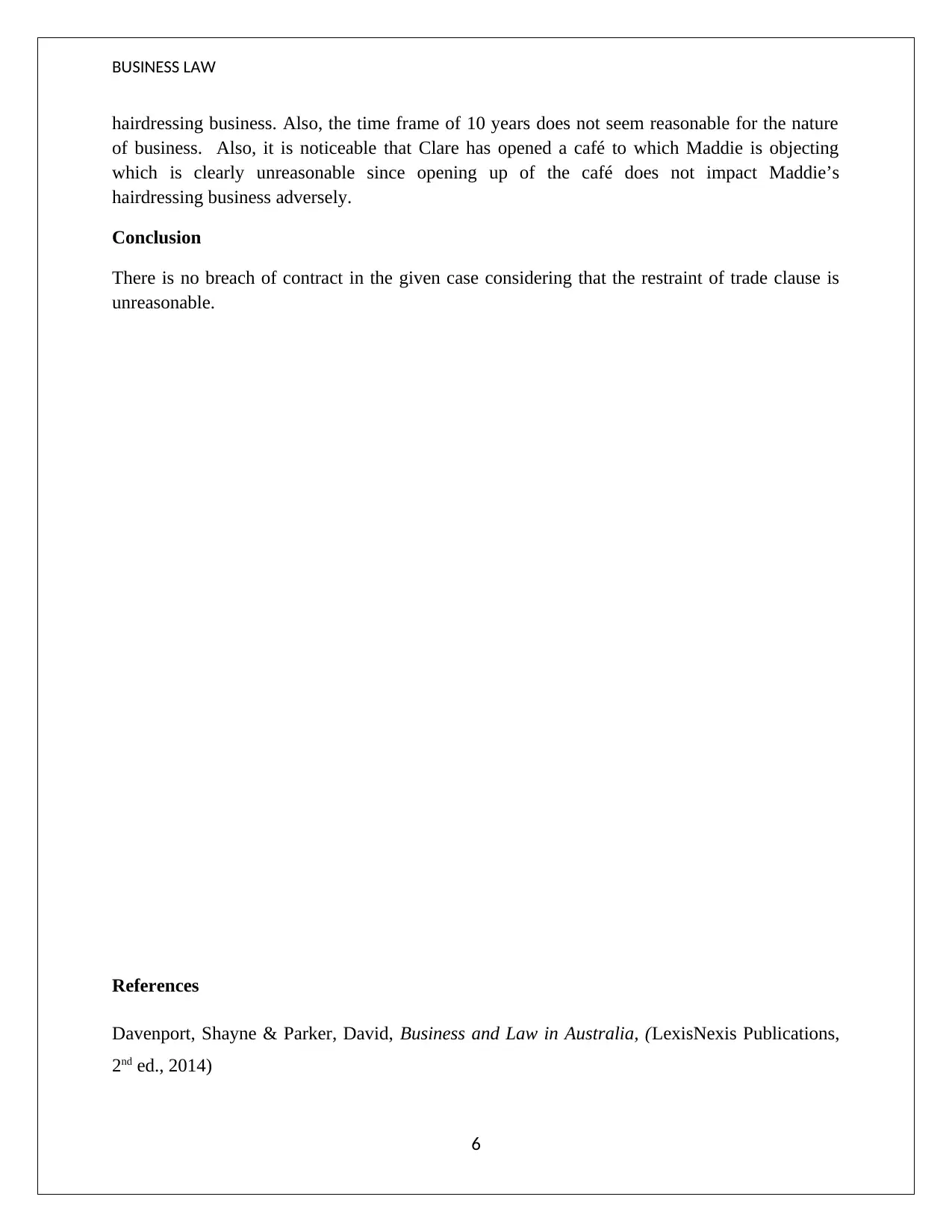
BUSINESS LAW
hairdressing business. Also, the time frame of 10 years does not seem reasonable for the nature
of business. Also, it is noticeable that Clare has opened a café to which Maddie is objecting
which is clearly unreasonable since opening up of the café does not impact Maddie’s
hairdressing business adversely.
Conclusion
There is no breach of contract in the given case considering that the restraint of trade clause is
unreasonable.
References
Davenport, Shayne & Parker, David, Business and Law in Australia, (LexisNexis Publications,
2nd ed., 2014)
6
hairdressing business. Also, the time frame of 10 years does not seem reasonable for the nature
of business. Also, it is noticeable that Clare has opened a café to which Maddie is objecting
which is clearly unreasonable since opening up of the café does not impact Maddie’s
hairdressing business adversely.
Conclusion
There is no breach of contract in the given case considering that the restraint of trade clause is
unreasonable.
References
Davenport, Shayne & Parker, David, Business and Law in Australia, (LexisNexis Publications,
2nd ed., 2014)
6
Paraphrase This Document
Need a fresh take? Get an instant paraphrase of this document with our AI Paraphraser
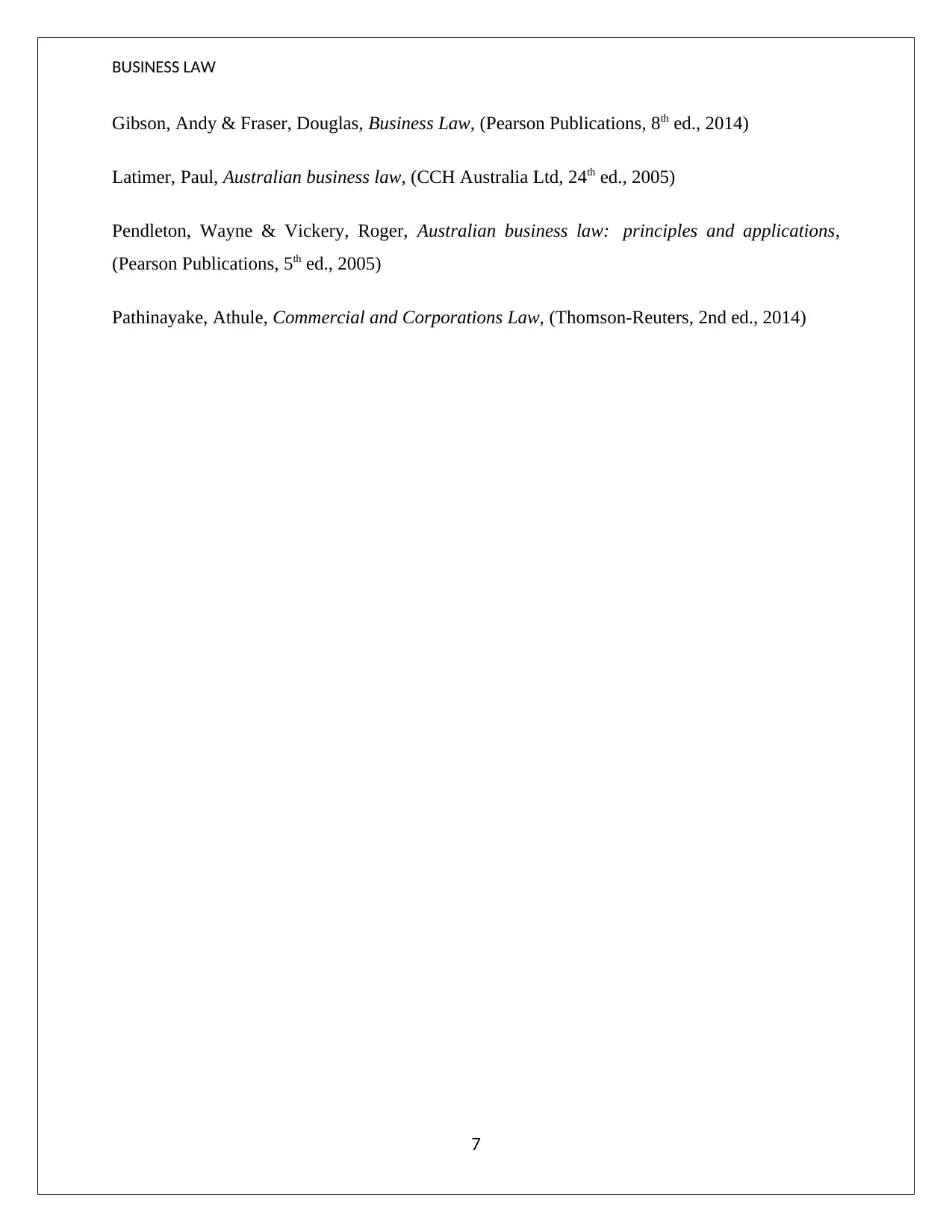
BUSINESS LAW
Gibson, Andy & Fraser, Douglas, Business Law, (Pearson Publications, 8th ed., 2014)
Latimer, Paul, Australian business law, (CCH Australia Ltd, 24th ed., 2005)
Pendleton, Wayne & Vickery, Roger, Australian business law: principles and applications,
(Pearson Publications, 5th ed., 2005)
Pathinayake, Athule, Commercial and Corporations Law, (Thomson-Reuters, 2nd ed., 2014)
7
Gibson, Andy & Fraser, Douglas, Business Law, (Pearson Publications, 8th ed., 2014)
Latimer, Paul, Australian business law, (CCH Australia Ltd, 24th ed., 2005)
Pendleton, Wayne & Vickery, Roger, Australian business law: principles and applications,
(Pearson Publications, 5th ed., 2005)
Pathinayake, Athule, Commercial and Corporations Law, (Thomson-Reuters, 2nd ed., 2014)
7
1 out of 8
Related Documents
Your All-in-One AI-Powered Toolkit for Academic Success.
+13062052269
info@desklib.com
Available 24*7 on WhatsApp / Email
![[object Object]](/_next/static/media/star-bottom.7253800d.svg)
Unlock your academic potential
Copyright © 2020–2026 A2Z Services. All Rights Reserved. Developed and managed by ZUCOL.





